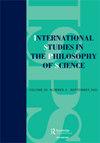Treatment Effectiveness and the Russo–Williamson Thesis, EBM+, and Bradford Hill's Viewpoints
IF 0.8
2区 哲学
Q2 HISTORY & PHILOSOPHY OF SCIENCE
International Studies in the Philosophy of Science
Pub Date : 2021-07-03
DOI:10.1080/02698595.2022.2054396
引用次数: 4
Abstract
ABSTRACT Establishing the effectiveness of medical treatments is one of the most important aspects of medical practice. Bradford Hill's viewpoints play an important role in inferring causality in medicine, and EBM+ seeks to improve evidence-based medicine, which is influential in establishing treatment effectiveness. At EBM+'s foundations lies the Russo–Williamson thesis (RWT), which can be seen as providing a reduction of Hill's viewpoints into those involving difference-making and mechanistic evidence, both of which are claimed by the RWT's proponents to be typically required for establishing causal claims in medicine. Yet little has been written on whether and how the RWT, EBM+, and Hill's viewpoints establish treatment effectiveness. This could be because of uncertainty over what treatment effectiveness is. I provide an account of treatment effectiveness, analysing the role of the RWT, EBM+, and Hill's viewpoints in this regard. I argue that Hill's viewpoints and EBM+ can be useful in helping to evaluate evidence, but cannot directly establish or confirm treatment effectiveness. This is partly because effectiveness, I claim, is subject to inductive risk and therefore determined by non-epistemic values, neither of which Hill's viewpoints nor EBM+ offer guidance on. I conclude by reinterpreting Hill's viewpoints in light of establishing treatment effectiveness.治疗效果与Russo-Williamson论文、EBM+和Bradford Hill的观点
确定医疗的有效性是医学实践中最重要的方面之一。Bradford Hill的观点在推断医学因果关系方面发挥着重要作用,EBM+寻求改进循证医学,这对确定治疗效果有影响。在EBM+的基础上是Russo–Williamson论文(RWT),该论文可以被视为将Hill的观点简化为涉及差异制造和机制证据的观点,RWT的支持者声称这两种观点通常是建立医学因果关系所必需的。然而,关于RWT、EBM+和Hill的观点是否以及如何建立治疗有效性,几乎没有文献报道。这可能是因为治疗效果的不确定性。我提供了治疗效果的说明,分析了RWT、EBM+和Hill在这方面的观点的作用。我认为Hill的观点和EBM+可以帮助评估证据,但不能直接确定或证实治疗效果。这在一定程度上是因为,我声称,有效性受到诱导风险的影响,因此由非认知价值观决定,Hill的观点和EBM+都没有提供指导。最后,我根据确定治疗有效性的角度重新解释Hill的观点。
本文章由计算机程序翻译,如有差异,请以英文原文为准。
求助全文
约1分钟内获得全文
求助全文
来源期刊

International Studies in the Philosophy of Science
HISTORY & PHILOSOPHY OF SCIENCE-
自引率
12.50%
发文量
10
期刊介绍:
International Studies in the Philosophy of Science is a scholarly journal dedicated to publishing original research in philosophy of science and in philosophically informed history and sociology of science. Its scope includes the foundations and methodology of the natural, social, and human sciences, philosophical implications of particular scientific theories, and broader philosophical reflection on science. The editors invite contributions not only from philosophers, historians, and sociologists of science, but also from researchers in the sciences. The journal publishes articles from a wide variety of countries and philosophical traditions.
 求助内容:
求助内容: 应助结果提醒方式:
应助结果提醒方式:


